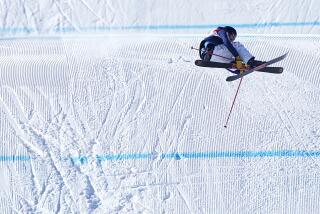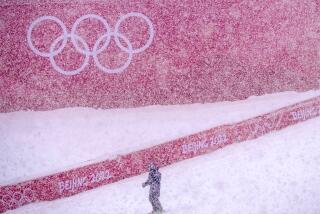The key to ski cross: Start fast, then stay out of the way
- Share via
Reporting from Vancouver, Canada — Thinking of it as running with the bulls
Only your mind drifts away from the streets of Pamplona, Spain, to banked turns, big jumps and four jousting racers on the ski-cross course at Cypress Mountain.
Ski cross?
The semi-offspring of snowboard cross is set to make its Olympic debut Sunday morning when the men take the course for time trials. The sport is best watched with a double shot of espresso chased by a can of Red Bull, accompanied by a very loud soundtrack
No smoothing Christopher Cross for ski cross. More like some heavy metal before the medals get sorted out.
The eye-catching success of snowboard cross in its Olympic debut four years ago in Turin, Italy, opened the door for ski cross, which began in the early 1980s and has been wildly popular in the Winter X Games.
Less than a year after the Turin Games, the International Olympic Committee voted to include ski cross in the 2010 Games while rejecting several other sports, including women’s ski jumping and curling mixed doubles. It is the only new sport in Vancouver.
It was not lost on IOC members that the freestyle skiing sport of ski cross could have tremendous television potential.
That was illustrated recently during the Winter X Games when crashes involving U.S. veterans Daron Rahlves and Casey Puckett seemed to be on an endless television loop.
“It’s almost like a cabbie in New York racing through traffic, and not to crash,” Rahlves said. “And that’s what we do out there.”
The X Games crashes nearly ended the latest Olympic hopes for Rahlves and Puckett, both former Olympians in Alpine events. Rahlves, 36, dislocated his right hip in the first run at the X Games in Aspen, Colo., last month and is calling himself “88%” recovered.
Puckett, 37, needed surgery on his shoulder Jan. 13, then reinjured it at the X Games. This will be the fifth Olympics for Puckett and the fourth for Rahlves. There has been a documentary crew following the oft-injured Puckett for three years as it films “Appointment in Vancouver.”
One of the top ski cross competitors happens to be American-born Chris Del Bosco, who is representing Canada and is ranked third in the World Cup standings. Another Canadian, Dave Duncan, is out after he broke his collarbone Friday in training.
Ski cross had plenty of other former Alpine stars pursuing a second career, of sorts, in ski cross.
“There’s that element of risk, but that’s why we gravitate toward it,” Puckett said.
Rahlves said that the risks are more calculated in Alpine races than in ski cross.
“There are a few key spots to key in on,” he said after a training session Friday. “You have to wait until an opportunity opens up, so patience has a big payoff. It’s not you against the clock -- it’s you against the other guys.”
In fact, the clock does come into play in the morning qualification runs. That’s when the skiers are timed and then placed into heats of four skiers each.
Then there are four rounds to determine to medal winners, and quite likely . . . plenty of crashes.
“I grew up racing my buddies to the lodge for hot chocolate,” Rahlves said. “Now we’re doing it for medals.”
twitter.com/reallisa
More to Read
Go beyond the scoreboard
Get the latest on L.A.'s teams in the daily Sports Report newsletter.
You may occasionally receive promotional content from the Los Angeles Times.







